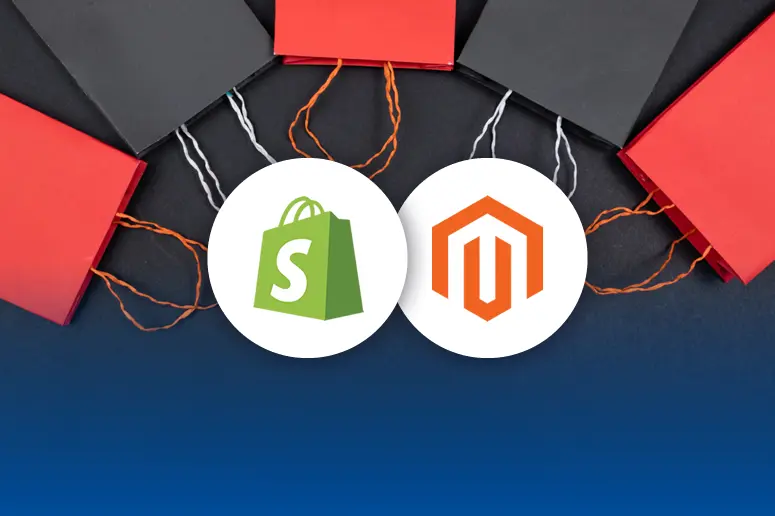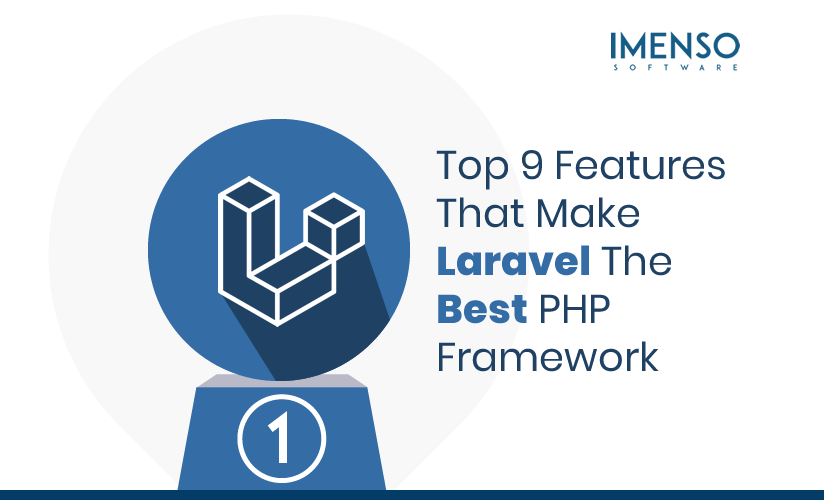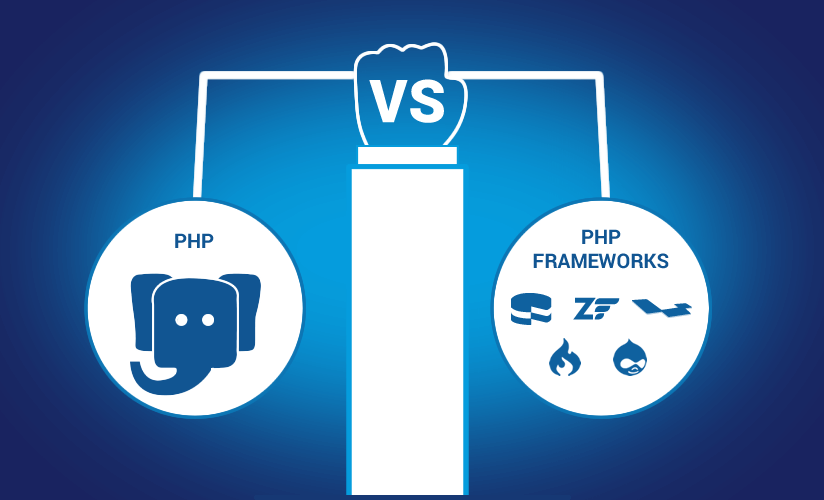Magento vs. Shopify: Choosing the Right E-Commerce Platform for Your Business

Are you in search of the perfect e-commerce platform that will take your business to new heights? The world of online selling offers a myriad of choices, each promising unique features and advantages. It’s a daunting journey, as over 75% of businesses face the challenge of selecting the right platform for their online store. Fear not, for our blog is here to guide you through this enchanting adventure, where we unravel the secrets of two mighty contenders: Magento and Shopify.
In this blog, we will embark on a comprehensive exploration, comparing Magento and Shopify to uncover their strengths and weaknesses. If you are a daring entrepreneur launching a startup or a seasoned merchant leading an established enterprise, our guiding light will help you make an informed decision. Picture a platform that not only scales effortlessly with your ambitions but also reflects the soul of your brand in every aspect.
This journey of discovery will empower you to create a captivating online store that enchants your customers and keeps them coming back for more. So, let us embark on this thrilling quest together, unlocking the door to e-commerce splendor and revealing the secrets that will elevate your business to ethereal heights. Welcome to the realm of Magento vs. Shopify: Choosing the Right E-Commerce Platform for Your Business.
The Importance of Choosing the Right E-Commerce Platform 
- Optimal User Experience: In the competitive world of e-commerce, providing an exceptional user experience is key to attracting and retaining customers. A well-designed and user-friendly online store can significantly impact customer satisfaction and encourage repeat business. The right e-commerce platform should offer intuitive navigation, fast page loading times, and a smooth checkout process, ensuring that visitors can easily find and purchase products without any hassle. A clunky or slow website can drive potential customers away, resulting in lost sales and a negative perception of your brand.
- Scalability and Growth Potential: As your business grows, so do the demands on your e-commerce platform. Scalability is essential to accommodate increasing traffic, expanding product catalogs, and handling higher transaction volumes. Choosing a platform that can scale with your business ensures a seamless experience for your customers, even during periods of peak demand. A scalable e-commerce solution saves you from the hassle of migrating to a different platform as your business expands, thereby minimizing disruptions and additional costs in the long run.
- Customization and Personalization: Every business has its unique requirements and branding, and the ability to customize your online store to reflect your brand identity is crucial. The right e-commerce platform should offer extensive customization options, allowing you to create a distinctive and personalized shopping experience for your customers. Personalization, such as targeted product recommendations and tailored marketing messages, enhances customer engagement and boosts conversion rates. A platform that allows for seamless integration with third-party systems and tools also opens up opportunities for advanced customization and feature enhancements.
- Security and Trust: In the digital world, cybersecurity is a top concern for both businesses and consumers. A secure e-commerce platform protects sensitive customer data, such as personal information and payment details, from potential threats and attacks. Choosing a reputable and secure platform not only safeguards your customers’ trust but also protects your business from potential liabilities and reputational damage. Look for platforms with robust security features, regular updates, and compliance with industry standards to ensure your store and customer data remain safe.
- SEO and Visibility: An e-commerce platform that is search engine friendly can significantly impact your online visibility and organic traffic. Search engine optimization (SEO) is essential for attracting potential customers to your website through search engines like Google. The right platform should offer built-in SEO tools and features that make it easier for your store to rank higher in search results, driving organic traffic and potential sales. Improved SEO capabilities also mean that your store is more likely to be discovered by new customers, expanding your customer base.
- Integration and Compatibility: In today’s interconnected digital landscape, integrating your e-commerce platform with other essential business tools and systems is essential for streamlining operations and data management. Whether it’s inventory management, customer relationship management (CRM), email marketing, or analytics, seamless integration between your e-commerce platform and third-party applications enhances efficiency and reduces manual efforts. Compatibility with various payment gateways and shipping providers is also crucial for offering a smooth checkout experience to your customers.
- Cost-Effectiveness and ROI: Choosing the right e-commerce platform involves considering both short-term costs and long-term return on investment (ROI). While some platforms may offer low upfront costs, they may come with hidden fees, transaction charges, or limited scalability. On the other hand, investing in a robust and feature-rich platform might require higher initial costs but can yield higher returns through improved sales, customer retention, and business growth. Analyzing the total cost of ownership and evaluating the platform’s potential to generate revenue over time will help you make a well-informed decision.
Overview of Magento and Shopify
Magento is an open-source e-commerce platform that was first released in 2008 and is now owned by Adobe. It is known for its flexibility and scalability, making it a preferred choice for large enterprises and businesses with complex needs. Magento’s open-source nature allows for extensive customization, providing developers with the freedom to create unique online stores tailored to specific requirements.
On the other hand, Shopify is a hosted e-commerce platform founded in 2006. It offers a user-friendly interface and an all-in-one solution for businesses of all sizes, making it an excellent choice for startups and small businesses. As a hosted platform, Shopify takes care of hosting, security, and regular updates, allowing business owners to focus on managing their stores without worrying about technical aspects.
Understanding Magento 
- Overview of Magento: Magento is a robust e-commerce platform designed to cater to the needs of large enterprises and businesses with complex requirements. It offers a self-hosted solution, meaning that businesses are responsible for hosting and maintaining their stores. While this gives users greater control over their platform, it also requires technical expertise to set up and manage effectively.
- Features of Magento: Magento comes equipped with a wide range of features that empower businesses to create feature-rich online stores. Some of the key features include advanced product catalog management, powerful SEO capabilities, multi-store and multi-language support, flexible payment and shipping options, and robust security features. Additionally, Magento boasts a vast library of extensions and plugins, allowing users to extend the platform’s functionality as needed.
Pros of Magento
- Unmatched Customization Options: Magento’s open-source nature makes it highly customizable, enabling businesses to create unique and tailored shopping experiences for their customers. Developers can leverage a wide array of APIs and tools to build custom features and integrations.
- Scalability: Magento is built to handle large product catalogs and high traffic volumes, making it an ideal choice for businesses with ambitious growth plans. It can scale with your business as it expands, ensuring a seamless shopping experience for customers.
- Community Support: Being an open-source platform, Magento has a thriving community of developers, contributors, and users. This active community provides support, regular updates, and a vast collection of extensions and themes, enriching the overall Magento ecosystem.
Cons of Magento
- Complexity: Magento’s extensive customization options come with a steep learning curve. Building and managing a Magento store may require technical expertise and the assistance of experienced developers.
- Hosting and Maintenance Costs: As a self-hosted solution, businesses need to invest in hosting and ongoing maintenance to ensure optimal performance and security. This can result in higher operational costs compared to hosted platforms.
Understanding Shopify
- Overview of Shopify: Shopify is a popular hosted e-commerce platform designed to cater to businesses of all sizes, from startups to established enterprises. Its user-friendly interface and simplified setup process make it an attractive choice for entrepreneurs without extensive technical knowledge.
- Features of Shopify: Shopify offers a comprehensive set of features to help businesses create and manage their online stores efficiently. Some of its key features include a simple and intuitive store setup, an extensive selection of themes and templates, integrated payment gateways, built-in SEO tools, mobile responsiveness, and 24/7 customer support.
Pros of Shopify
- User-Friendly Interface: Shopify is renowned for its easy-to-use interface, allowing even beginners to set up and manage an online store without the need for technical expertise. The platform provides a seamless experience from store setup to daily operations.
- Hosting and Security: Shopify takes care of hosting and security, removing the burden of managing servers and ensuring that stores are secure and updated regularly. This is particularly beneficial for non-tech-savvy entrepreneurs who want a hassle-free e-commerce solution.
- App Ecosystem: Shopify’s app store offers a vast array of apps and plugins that allow businesses to extend their store’s functionality with ease. From marketing tools to inventory management, the app ecosystem empowers merchants to customize their stores according to their needs.
Cons of Shopify
- Limited Customization: While Shopify offers a range of themes and customization options, it may not be as flexible as Magento in terms of creating highly tailored experiences for specific business needs. Businesses with complex requirements may find certain limitations within the platform.
- Transaction Fees: While Shopify offers various pricing plans, lower-tier plans come with transaction fees on each sale. For businesses with high sales volumes, these fees can add up and impact overall profitability.
Choosing the Right Platform for Your Business
Business Size and Growth Plans: The size of your business and your growth plans play a vital role in determining the suitable e-commerce platform. If you’re a small business or startup with limited resources and a focus on rapid growth, Shopify’s ease of use and quick setup make it a compelling choice. On the other hand, if you’re an established enterprise with complex requirements and a need for extensive customization, Magento’s flexibility and scalability may be more appropriate.
- Technical Expertise and Resources: Consider the technical expertise within your team or the availability of external resources. Magento requires more technical knowledge to set up and maintain effectively, while Shopify’s user-friendly interface allows for easier management even with limited technical skills.
- Budget and Cost Considerations: Evaluate your budget and the total cost of ownership when comparing Magento and Shopify. While Shopify’s hosted solution may have a lower upfront cost, its transaction fees and potential app expenses should be taken into account. Magento’s self-hosted model may involve higher initial investments in hosting and development, but it offers greater control and fewer ongoing costs.
- Required Features and Customization Needs: Identify the specific features and customization requirements that are essential for your business. If your store requires highly specialized functionality and unique customer experiences, Magento’s open-source nature provides the flexibility to build custom solutions. Shopify, with its extensive app ecosystem, may also offer many off-the-shelf solutions for common features.
- Long-Term Scalability and Flexibility: Consider your long-term business goals and potential expansion plans. Magento’s scalability makes it an excellent choice for businesses looking to grow significantly over time. On the other hand, Shopify’s hosted infrastructure can handle growth efficiently, making it a suitable option for businesses aiming for steady and controlled expansion.
- Advantages of Shopify for Small Businesses and Startups: Shopify’s ease of use and simplicity make it a perfect fit for small businesses and startups. With its user-friendly interface and pre-built themes, entrepreneurs can quickly set up their online stores without the need for extensive technical knowledge. This allows business owners to focus on product development, marketing, and customer acquisition, all critical elements for a new venture.
- How Shopify Fits the Needs of Smaller Enterprises? : Startups and small businesses often have limited resources and a focus on growth. Shopify’s hosted solution relieves them of the burden of managing technical aspects such as hosting and security, enabling them to allocate resources efficiently. Moreover, the platform’s app ecosystem offers a wide range of affordable tools that streamline business operations, making it a cost-effective and practical choice for smaller enterprises.
- Advantages of Magento for Large Enterprises: Large enterprises often have unique requirements that demand extensive customization and integration. Magento’s open-source nature allows developers to tailor the platform to the specific needs of the business. Additionally, Magento’s scalability ensures that businesses can accommodate high volumes of traffic and large product catalogs without compromising performance.
- Tailoring Magento to Complex Projects: For large enterprises and businesses with complex projects, Magento provides the freedom to build custom solutions that cater to unique needs. With access to a vast array of APIs and extensions, developers can create bespoke functionalities that align perfectly with the company’s operations. This level of customization empowers businesses to provide exceptional user experiences and stand out in a competitive market.
Comparison Chart: Magento vs. Shopify
Features and Functionality
Magento
- Offers extensive customization options
- Suitable for complex projects and unique business needs
- Advanced product catalog management and SEO capabilities
- A vast library of extensions and plugins for added functionality
Shopify
- User-friendly interface with the easy setup process
- Best suited for smaller businesses and startups
- A comprehensive selection of themes and templates
- Extensive app ecosystem for feature extension
Customization Options
Magento
- Highly customizable due to its open-source nature
- Allows developers to create unique and tailored shopping experiences
- Provides access to APIs and developer tools for extensive modifications
Shopify
- Customization options are more limited compared to Magento
- Themes and templates can be modified to some extent
- App ecosystem offers pre-built solutions for common functionalities
Scalability and Performance
Magento
- Built for handling large product catalogs and high-traffic volumes
- Suitable for businesses with ambitious growth plans and scalability requirements
- Performance can be optimized through proper server configuration and caching
Shopify
- Hosted solution designed to handle growth efficiently
- Scales well for steady expansion
- Shopify’s infrastructure ensures reliable performance even during peak traffic periods
User-Friendliness
Magento
- Requires technical expertise for setup and management
- Steeper learning curve compared to Shopify
- More suitable for businesses with experienced developers or dedicated technical teams
Shopify
- Renowned for its user-friendly interface and straightforward setup process
- Allows non-tech-savvy entrepreneurs to manage their stores with ease
- Ideal for businesses without extensive technical resources
Cost and Pricing
Magento
- No licensing fees as it is open-source
- Costs associated with hosting, development, and maintenance
- The initial investment can be higher for businesses with complex customization needs
Shopify
- Offers tiered pricing plans with transaction fees on lower-tier plans
- Hosting and security costs are included in the subscription fees
- App expenses may vary depending on the required functionality
Support and Resources
Magento
- Active community support with regular updates and security patches
- A vast library of extensions and documentation is available
- Professional support and services available from third-party developers and agencies
Shopify
- 24/7 customer support via chat, email, and phone
- Extensive documentation and guides for self-help
- Robust app ecosystem with a wide range of plugins and themes
Wrapping it Up
Choosing the right e-commerce platform is a significant decision that requires careful consideration of your business’s specific needs and goals. Magento and Shopify cater to different business sizes and levels of technical expertise. While Magento offers unparalleled customization and scalability, Shopify excels in user-friendliness and ease of setup. By thoroughly analyzing your business requirements and comparing the features, pros, and cons of both platforms, you can make an informed decision that will set the foundation for a successful online store and contribute to the growth of your business.
Similar Posts

Average Time to Build a Website from Scratch in 2023
Whatever the field, a company’s online presence has a big impact on how successful it is. Many businesses still seem to be neglecting the fact that the majority of their customers tend to visit their websites before making a purchase. A strong online presence, particularly a website, can be crucial for increasing revenue. If your […]...

Top 9 Features That Make Laravel The Best PHP Framework
Laravel is an open-source PHP framework that was created by Taylor Otwell in 2011. The web application development framework is among the most trending PHP frameworks for various industry verticals. ...

Core PHP vs PHP Frameworks
PHP has been a cornerstone of web development for a long time. The LAMP stack (Linux, Apache, MySQL, and PHP) is still a frequently used part of web development, and it is something that people tend to learn in computing courses in college. Today, there are many other frameworks that web applications can be built […]...






